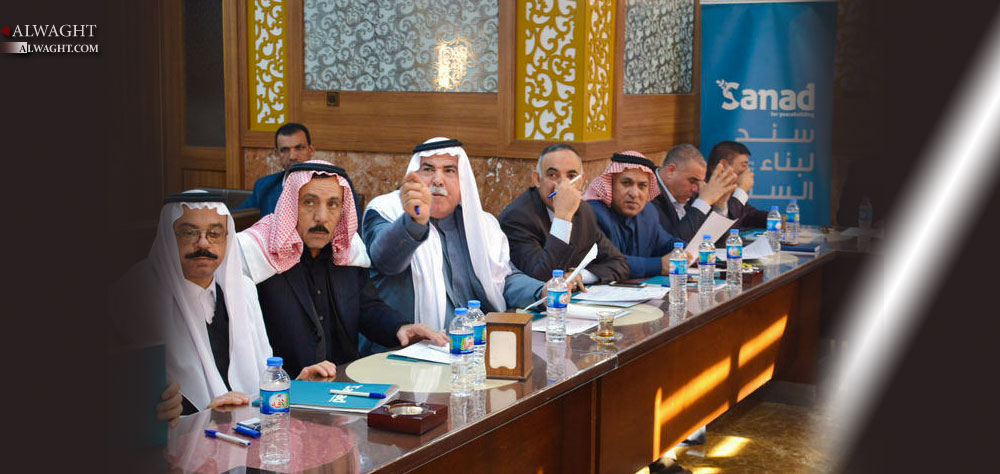Alwaght- Establishment on a sectarian and religious ideology basis is the defining feature of the political systems in a major number of the modern-day West Asian countries, a feature giving rise to various forms of forces and political struggles in these states.
This form of political makeup along with lack of adequate general awareness provides different political figures and parties with grounds to fuel sectarian conflicts for their own political benefits and goals.
Iraq is an example of such a system of governing in the region in which since fall of the former dictator Saddam Hussein in 2003 up to now sectarianism has been building a crucial base for different Iraqi group's political alliances. Sectarianism in Iraq is an instrument in the hands of political rivals for playing unlawful political games.
The Iraqi media reports in past few days have talked about Iraqi Sunnis' attempt to hold a comprehensive conference to reach a political agreement for tackling Sunni divisions and so ending the political scene losses in rivalry against the united Shiite forces. Some figures with corruption cases, the media note, like Tariq al-Hashimi, the former vice-president, and Rafi al-Issawi, the lawmaker and resigned finance minister, were invited to the meeting.
Tariq al-Hashemi, a member of the Iraqi Islamic Party– a branch of Muslim Brotherhood movement in Iraq– and a former leader of the party was picked on 2006 as the vice-president of Iraq by the Iraqi Accordance Front, a Sunni political coalition. But later he was hit by criminal charges. In 2011, a video tape showing some of his bodyguard team’s members confessing that they engaged in terror acts with direct orders from him left him fugitive, seeking asylum in the Kurdistan region in northern Iraq, Qatar, Saudi Arabia, and then Turkey.
After his escaping of the judicial proceedings, an Iraqi court in September and November 2012 held trial in absentia for him, sentencing al-Hashimi to death for criminal charges including bankrolling terror blasts in the country as well as involvement in murders of a lawyer and an army general.
Rafi al-Issawi also went under criminal charges. A court issued arrest warrant for al-Issawi, the former finance minister under former Prime Minister Nouri al-Maliki, for corruption and “involvement in terror actions”. But he failed to abide by the judicial verdict. He attended the anti-government Al-Anbar protests in 2013 organized by Sunni activists, announced his resignation from ministerial post, and declined to attend the court sessions to defend his claims of innocence.
The analysts maintain that invitation of such notorious figures is certainly an effort to clean up their records and claim that the court charges against them were politically motivated. This will cast doubts on independence of the country’s judiciary and imply discrimination against the Sunni politicians. Such a plan will help the organizers insist on setting aside the differences and moving towards Sunni unity in Iraq.
The organizers of the conference are not alone as they are backed by foreign governments to put strains on the central government. Turkey in 2011 welcomed Tariq al-Hashimi on its soil and granted him Turkish citizenship and thus a permanent right to stay in the country. In 2012, Recent Tayyip Erdogan, then prime minister of Turkey, dismissed the terrorism charges against al-Hashimi as unreal and said that he could stay in Turkey as long as he wanted.
The US, on the other side, called for return of al-Hashimi to the country as part of a process for national reconciliation.
Moreover, Rafi al-Issawi had travelled to Saudi Arabia before announcing his resignation as finance Minster under al-Maliki in March 2013, according to media reports.
In April 2016, Interpol Supervision Committee announced dropping al-Hashimi's name from its Red Notice for what it called inadequate and unpersuasive evidences presented by the Iraqi authorities charging him with terrorism connection. In 2012, the Interpol had issued arrest warrant for the fugitive al-Hashimi at the behest of the Iraqi government then led by PM al-Maliki.
But such political unity among the Sunni forces, the analysts note, will not manage to press the court to drop the criminal charges against al-Hashimi and al-Issawi, because beside investigations and official confessions of the al-Hashimi guards to his terrorism links, the Iraqi people insist on the two being tried. After al-Hashimi fled to Iraq’s Kurdistan region, people held rallies urging the regional authorities there to hand over the fugitive politician to central government.
People familiar with cases of the two say that even in case of retrying them in official court, there is a small chance that their trial will end in their acquittal. Since 2003, the central government, although under pressure from foreign parties to limit its relations with the neighboring Iran and the Axis of Resistance, did not fully compromise its leverage and kept its political independence. In this case too, the lawmakers, judiciary, and PM Haider al-Abadi government are expected to prioritize law enforcement as a popular demand.



























